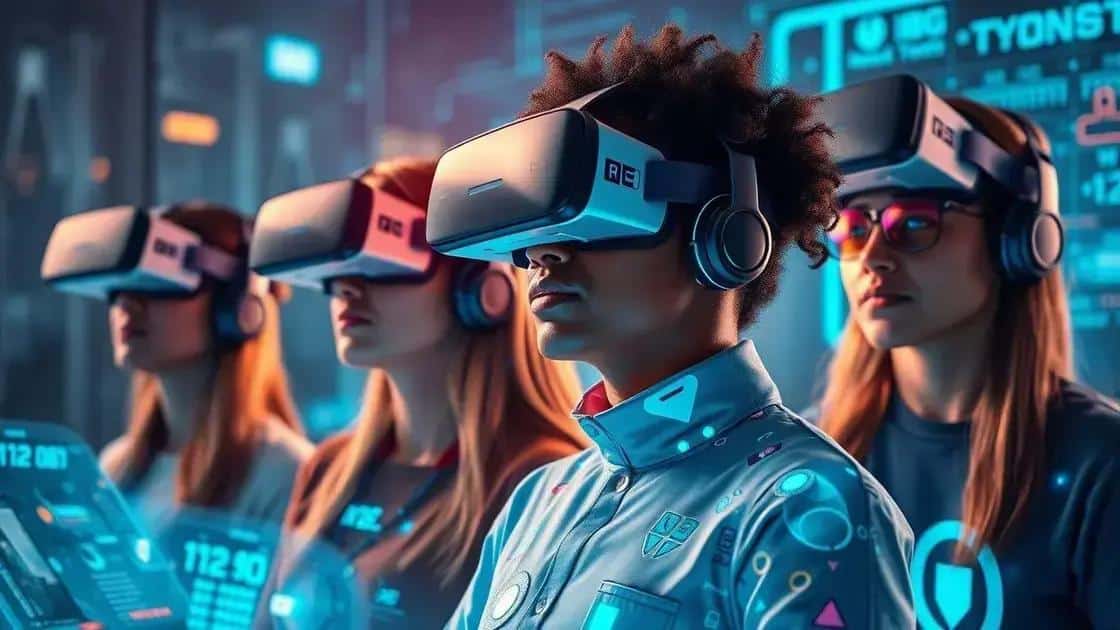AI-generated media trends reshaping the digital landscape

The future of media with AI innovations includes enhanced personalization, automated content creation, and immersive experiences, significantly transforming how audiences engage with and consume digital content.
AI-generated media trends are transforming the way we engage with digital content. Have you noticed how this technology influences your online experiences? Let’s dive into the exciting developments.
Emerging trends in AI-generated media
The world of AI-generated media is rapidly evolving, bringing exciting possibilities for creators and consumers alike. As we explore the emerging trends in this field, it becomes clear that technology is shaping the way we produce and engage with content.
Personalized Content Creation
One of the most impactful trends is the rise of personalized content. With AI algorithms analyzing user data, media can be tailored to match individual preferences. This means content is more relevant and engaging. For example, news articles can be curated based on your interests, while advertisements reflect your shopping habits.
Increased Accessibility of Creation Tools
The accessibility of AI-generated media tools is transforming who can create content. No longer restricted to professionals, anyone can use these tools to produce high-quality visuals or write engaging stories.
- Simple interfaces for users
- Automated processes to save time
- Greater diversity in content creators
This democratization of media means that even small creators can compete with larger studios, leading to a more diverse content landscape.
Moreover, the evolution of deepfake technology has raised fascinating discussions about authenticity in media. While deepfakes can be used for harmless fun, they also come with responsibilities for creators.
Integration with Virtual and Augmented Reality
Another exciting trend is the integration of AI-generated media with virtual and augmented reality. This fusion offers immersive experiences that transport users to new environments, enhancing storytelling.
- Engagement through interactive content
- More lifelike representations
- Innovative marketing strategies
As technology progresses, the possibilities are endless. The ability to blend AI capabilities with virtual experiences leads to creative ways for businesses to connect with audiences.
Impact on content creation and marketing

The impact of AI-generated media on content creation and marketing is significant and transformative. As businesses adopt these technologies, they can create more engaging and personalized content for their audiences.
Enhanced Creativity and Efficiency
AI tools streamline the creative process, allowing marketers to generate ideas faster. They can analyze data quickly and suggest content that resonates with target audiences. This adaptability means companies can respond to trends almost in real-time, keeping their content fresh and relevant.
Personalization at Scale
Another key advantage is the ability to deliver personalized content at scale. Through machine learning, AI analyzes consumer behavior, enabling marketers to tailor messages effectively. This leads to higher engagement rates and improved customer satisfaction.
- Customized recommendations
- Targeted advertising strategies
- Dynamic content delivery
When users feel that content speaks directly to them, they are more likely to engage and convert, resulting in higher ROI for businesses.
Furthermore, with AI-generated visuals and copy, brands can maintain a consistent narrative across platforms. This consistency builds trust and recognition, essential components in today’s crowded market.
Cost-Effectiveness and Resource Allocation
Utilizing AI in content creation brings not only creativity but also cost-effectiveness. By automating repetitive tasks, teams can focus on strategic planning and creative brainstorming. This shift leads to optimal use of resources, resulting in better productivity overall.
- Reduces time spent on mundane tasks
- Allows for reallocation of human resources
- Enables faster turnaround on marketing campaigns
The synergy of efficiency and creativity positions businesses to thrive in a competitive landscape. As companies embrace these changes, the marketing world is bound to evolve dramatically.
Ethical considerations in AI-generated content
When discussing ethical considerations in AI-generated content, it is essential to recognize the challenges that arise with the use of artificial intelligence. As the technology becomes more prevalent, questions about responsibility and accountability come to the forefront.
Ownership and Copyright Issues
One significant concern involves ownership of AI-generated works. If an AI creates art or content, who holds the copyright? Is it the developer, the user, or the AI itself? These questions are crucial as they can affect how creators and businesses protect their intellectual property.
Transparency and Disclosure
Another vital aspect is the need for transparency. Consumers should know when they are interacting with AI-generated content. This helps build trust between creators and users. For instance, labeling content as AI-generated can clarify its origin and avoid misleading situations.
- Establishing clear guidelines for labeling
- Ensuring users understand AI’s role in content creation
- Encouraging open discussions about AI’s capabilities
Moreover, maintaining transparency can help prevent misinformation, especially in fields like journalism and marketing. This ensures that users are not deceived by manipulated or fabricated information.
Bias and Fairness
Addressing bias in AI-generated content is also critical. AI systems learn from existing data, which can contain biases. This can result in content that perpetuates stereotypes or excludes certain groups. Companies must actively work to identify and mitigate these biases to create fair and inclusive content.
- Regularly auditing AI algorithms
- Implementing diverse training data
- Encouraging feedback from diverse user groups
By addressing these concerns, businesses can use AI responsibly while fostering ethical practices in content creation.
The future of media with AI innovations

The future of media with AI innovations is exciting and full of possibilities. As technology advances, we are seeing new ways to create, distribute, and consume content.
Increased Automation
One prominent trend is increased automation in content creation. AI tools can now write articles, generate videos, and create graphics. By automating these processes, media companies can save time and reduce costs.
Enhanced User Experience
AI is also enhancing the user experience through personalized content recommendations. By analyzing viewer preferences, AI can suggest shows or articles tailored to individual tastes. This results in a more engaging experience for users.
- Customized viewing suggestions
- Adaptable news feeds
- Interactive storytelling elements
As users interact with content, AI learns and improves its recommendations, keeping the audience engaged and invested.
Immersive Technologies
Another exciting development is the integration of AI with immersive technologies like virtual reality (VR) and augmented reality (AR). These technologies offer new opportunities for storytelling, allowing audiences to experience narratives in unique ways.
- Interactive simulations
- Augmented reality ads
- VR experiences for major events
This integration makes content more vivid and engaging, inviting users to participate actively rather than passively consuming information. As these innovations continue to evolve, they will redefine how we experience media.
Overall, the impact of AI on the media landscape is profound. As technology continues to advance, we can expect a dynamic shift in how content is created and consumed, paving the way for more interactive and personalized experiences.
FAQ – Frequently Asked Questions about AI Innovations in Media
What impact does AI have on content creation?
AI significantly speeds up content creation, allowing for automation in writing and graphics, which helps save time and resources.
How does AI personalize user experiences?
AI analyzes user behavior to offer tailored content recommendations, making media consumption more relevant and engaging.
What role does ethics play in AI-generated content?
Ethics are crucial in ensuring AI is used responsibly, addressing concerns like ownership, bias, and transparency in content.
Can AI improve audience engagement in media?
Yes, AI can create immersive experiences and interactive storytelling, which enhances audience engagement and loyalty.





